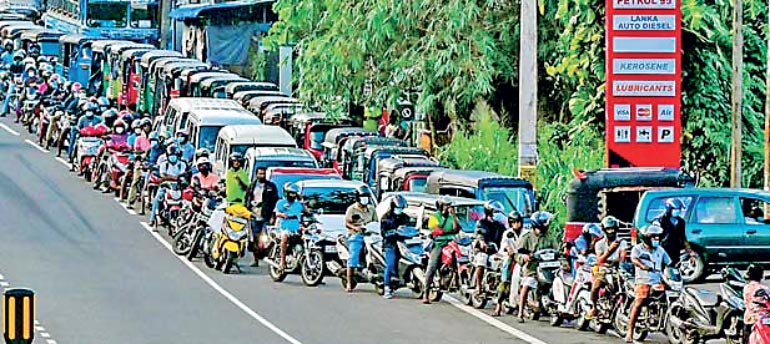Tuesday Feb 17, 2026
Tuesday Feb 17, 2026
Tuesday, 20 December 2022 02:25 - - {{hitsCtrl.values.hits}}

If some critical economists in the centres of hegemonic power are already anticipating waves of global economic challenges that are to be upon us sooner rather than later, then it is high time that the establishment in Sri Lanka catch up fast, especially considering the catastrophe that is already occurring within the country

Back in the early days of the COVID-19 pandemic, it looked like Western consumer demand was going to collapse. People were losing their jobs and businesses were closing around the world, especially in major service industries such as restaurants and hospitality. Several of us came together in our “Combating Crisis” column in the FT to try and think through these changes in the context of Sri Lanka’s own economic reckoning. We assumed that the crisis marked the end of the neoliberal export model for poor Southern countries such as Sri Lanka.
We thought that what appeared to be imminent global recession, if not depression, would provoke a shift toward self-sufficiency, in contrast to the previous decades over which the wages of Southern workers had been repressed to produce cheap goods for mass consumption in Western countries. Instead, over the past several years, Western demand has appeared to have temporarily revived, thanks especially to massive stimulus, including both the CARES Act and the American Rescue Plan in the US. A key component of these programs was that the US Government sent direct stimulus payments to its citizens.
Now, several years later, it seems that we are once again at an inflection point in the trajectory of the global economy. Western Central Banks such as the US Federal Reserve have raised interest rates to try and control inflation, which some establishment economists blamed on the earlier stimulus. However, as progressive economists have shown us, these price pressures were in fact catalysed by sector-specific supply shocks. Isabella Weber, Jesus Laura Jauregui, Lucas Teixera, and Luiza Nassif Peres, for example, have argued in their recent working paper for the University of Massachusetts – Amherst, “Inflation in Times of Overlapping Emergencies,” that the urgent need going forward is to develop policies that can manage “systematically significant prices,” including energy and housing.
These economists are proposing a new policy framework, such as price controls and long-term investment, to try and manage these shocks. Meanwhile, because of the US’s own post-pandemic recovery along with specific actions taken by the Biden administration, such as releasing oil from the Strategic Petroleum Reserves to control energy prices, the US Federal Reserve is considering slowing down its rate increases. The current rate, after the most recent increase the week of 12 December, is roughly 4.5%, which is the highest it has been since the start of the Great Recession of 2007-2008.
For Sri Lanka, however, this is cold comfort. The effects of financial tightening have already had a severe impact, with outflows of capital from emerging markets putting further pressure on the country’s debt servicing costs. But there is a lesson here as well in terms of an underlying shift in macroeconomic thinking. Heated debates between establishment figures and progressive economists have revealed the hard limits of a paradigm that was built on the monetarist thinking popularised by figures such as Milton Friedman, along with the New Keynesian accommodation with some of its major assumptions. The idea behind monetarism is that price increases can supposedly be controlled through monetary policy, namely by raising interest rates. This intellectual framework, which developed as capital’s response to the demands of organised labour in the 1970s, asserts that price increases are the effect of excessive demand.
Containing demand supposedly requires interest rates to cool the economy and avert wage-price spirals. Recent debates in Western countries start from the assumption that price increases affect working people more. But, as more and more economists are arguing, their cause must be located elsewhere. The response should not be to engineer a global recession, which hurts lower income groups the most, especially by undermining tight labour markets that give workers more leverage to organise and demand better livelihoods. Rather, the goal should be to contain and prevent supply shocks. For Sri Lanka, which is already experiencing an economic depression, this lesson must be urgently heeded. Yet extremely counterproductive monetarist thinking continues to be uncritically reproduced and disseminated by prominent voices within Sri Lanka’s economic establishment.
Breaking out of the intellectual straitjacket
For Sri Lanka, import-induced inflation has meant that prices have increased across the board, reaching as high as over 70% this past September, when registered as a year-over-year increase. Still, inflation appears to be easing ever so slightly. It may even be an excuse for the Central Bank to slow its own rate increases. But as Ahilan Kadirgamar in a recent column, “Shock Policies and Wage Repression,” points out, the damage has already been done by this and other policy measures. Working people’s incomes are now worth roughly half their earlier value.
Meanwhile, the long-term changes foreshadowed by the pandemic are unlikely to go away, specifically the growing inflationary pressures within the global economy. These include economic decoupling, up to and including direct military confrontation between hegemonic global powers, in addition to the impact of climate change. In this context, although we may have initially jumped the gun in our FT series by hypothesising that the Western export-led order had come to a swift and sudden end, massive structural changes are still occurring.
What major sectors of the global economy will look like in the future, including their reflection in terms of trends in consumer demand and possible export markets, are anyone’s guess. But for Sri Lanka, the impact of wage repression on people, including alarming reports of skyrocketing child malnutrition, has already been dramatic. Despite limited signs of recovery in select export markets, the reality is that going forward, global growth will be extremely precarious and uncertain.
This conjuncture is echoed in earlier analysis by the late development economist Abhijit Sen in his contribution to the book, Trade and Industrialisation (ed. Deepak Nayyar), “On Economic Openness and Industrialisation,” published in 1997. He helpfully summarised a long debate when he argued that the problem with earlier arguments for Import Substitution Industrialisation was that, like their later neoliberal opponents, they assumed that the balance of payments constraint is the major problem for underdeveloped countries.
Because they started from this assumption, even those Governments with social democratic leadership still thought that foreign loans would be necessary for purchasing the inputs to modernise the economy. But, as Sen showed, there has been an alternative track, influenced by the Polish economist Michal Kalecki, among others, that recognises that other domestic rigidities, especially in the agricultural sector, must first be overcome to create a sustainable path to development. Taking Sen further, we could argue that this way of formulating economic policy could better accommodate the needs of lower income groups through measures such as agrarian reform, thereby creating a stable political order.
Because of both the immediate economic emergency in Sri Lanka, which reveals sharpening inequalities, and the longer global changes that are slowly but surely becoming visible, it is imperative to revisit this debate. What is the Wickremesinghe-Rajapaksa Government and the policy making establishment doing about it? The Government, of course, is focused on the IMF agreement. It is using the semblance of negotiation (or lack thereof) as an excuse to try and wreck any sense of direction in terms of sustaining the residual elements of the welfare state. The existing, meagre social protection is people’s last resort in an economic depression. But the proposed IMF agreement and the austerity that it demands are predicated on extremely shaky intellectual foundations. That includes the alleged need to target a primary surplus to try and attract investors from abroad. The economic theory behind this type of agreement is increasingly being questioned within the hegemonic Western countries themselves.
Learning relevant lessons
Of course, as Sen, as many others, including Ha-Joon Chang, have noted in acerbic terms, the West often practices the opposite of what it preaches. Price controls, windfall taxes, and direct state intervention in the economy are increasingly becoming options of serious consideration within the Western policy establishment in response to crisis. But, at the same time, the IMF insists Sri Lanka must implement cost recovery energy pricing. Nevertheless, the point is that in addition to the visible hypocrisy, there are deeper shifts in the global economy occurring that regardless will force Sri Lanka’s elites to consider an alternative solution.
Whatever limited, uneven recovery has occurred within the US specifically—as compared, for example, to the UK, which is still facing a daunting economic future—is not because things will automatically continue to get better. Instead, it is because of a decisive shift in policy making backed by the US’s own hegemonic global position. Without a consolidated ideological framework, however, even these modest gains are liable to be reversed. Moreover, and especially relevant to Sri Lanka’s situation, to engage in the level of planning and coordination needed to rescue the country from the abyss will also require mass mobilisation through democratic structures. This is the type of counter-vailing power that can establish clear guidelines for state intervention. Protest and struggle can resist elite attempts to monopolise the benefits, including by extracting rents.
But to cast aside the question of state intervention as such, or even to pretend that it does not exist because shock financial policies and privatisation will supposedly save the day, is complete nonsense. In Sri Lanka, thanks to the Governments led by Gotabaya Rajapaksa and Ranil Wickremesinghe that have suppressed or otherwise ignored dissent, the immediate years after the onset of the COVID-19 pandemic have been wasted. This has had devastating consequences for working people especially. To overcome the massive crisis that this temporising has created—and to avert a future outcome that could somehow be, unimaginable as it may seem, even worse than the present—it is critical to put forward a new economic model through which domestic investment can be revived. In a depression, when, as John Maynard Keynes pointed out, private enterprise is withdrawing, that investment must be both state-driven and shaped by the demands and interests of working people struggling to survive.
Pursuing this option is impossible, however, within the framework of an internationalised economic agreement that rules it out because of outdated assumptions. Still, there is something to learn from the cracks in the mainstream consensus in the dominant countries that oversaw the neoliberal hegemonic order, which is now under tremendous strain. The lessons should be teased out from whatever initial benefits may have appeared in those places thanks to the hesitant yet telling breaks with neoliberalism that have already occurred.
These alone have averted the most immediate global disaster that we may have otherwise thought likely. But the global unravelling is far from over. The establishment in Sri Lanka cannot afford to wager the political, economic, and social consequences by betting on the re-emergence of a world in which the crisis never occurred. If some critical economists in the centres of hegemonic power are already anticipating waves of global economic challenges that are to be upon us sooner rather than later, then it is high time that the establishment in Sri Lanka catch up fast, especially considering the catastrophe that is already occurring within the country.